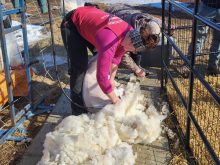CLARESHOLM, Alta. – Feeding oilseeds to feedlot cattle can produce positive nutritional and environmental benefits, but the cost may not be reasonable.
“Oilseeds aren’t really a cheap source of energy or protein but they do have a place,” said Darryl Gibb, of Agriculture Canada’s research centre in Lethbridge.
“Unless you can get the oilseeds pretty cheap it might not pencil out,” he told producers gathered at Claresholm Beef Producers, where cattle received oilseeds in rations this summer.
It may also be difficult to buy off-grade oilseeds, which makes barley the cheapest source of energy.
Read Also

Charges laid after cattle theft
Saskatchewan RCMP lay two charges against a man after six cattle went missing.
Edible oils such as those derived from canola, flax, corn or sunflowers in feedlot rations can alter the animal’s rumen environment and reduce methane emissions, a common greenhouse gas. Demonstrations at two feedlots, at Claresholm, Alta., and Lanigan, Sask., were run this year with results still under study.
John McKinnon of the University of Saskatchewan said feeding oilseeds added energy to the diet and improved feed efficiency so cattle gained more on less feed.
Oils in the diet may help buffer the effects of finishing rations that can contain 85-95 percent grain, which could lead to damage to the rumen wall, acidosis, liver abscesses and laminitis. These effects are partly alleviated by feeding fibre from mature forages.
Oils do not cause rumen upsets because they are digested in the small intestine.
The feed trials substituted a small percentage of oilseeds with barley as a source of energy. While there appeared to be small benefits in the animal’s overall performance in gain, net feed efficiency and meat yield, there is a caveat.
“From the performance benefits we have seen I don’t know if economically we can justify it,” McKinnon said.
However, if the feeding of tallow is banned, cattle rations will need to find a fat substitute. Feeding oilseeds also appears to lower methane emissions but that may not be enough to entice producers to use more.
Another U of S researcher, Hushton Block, anticipates lower methane gas emissions when a final analysis is done.
The feedlot trials measured the cattles’ burps with special individual attachments. Most methane comes out the mouth. Another device attempted to measure the air around the pens, but collection was more difficult.
Vern Racz of the Prairie Feed Resource Centre in Saskatchewan praises the practice as a good way to get rid of lower quality oilseeds that have been frostbitten, overheated or contain too many green seeds. A quarter of the oilseed crop in Saskatchewan falls into the lower grades.
Nutritionally, sunflowers, canola and flax contain 19.8-24.6 percent protein and 44 percent oil, a good source of energy.
The oils have other nutritional benefits. Flax, for instance, has a high level of alpha linolenic acid also known as omega 3 with its proven human health benefits. Flax is fed to laying hens to produce eggs high in omega 3 fatty acids.
“The possibility is there to produce food products but there are other advantages to feeding these fats such as greenhouse gas emissions,” said Racz.
These oils must be handled carefully because if more than five to seven percent is added to the diet it could interfere with fibre digestion.
Small oilseeds like flax or canola need to be mixed and processed with barley to break the seeds down, as well as to make the feed flow easier.

















